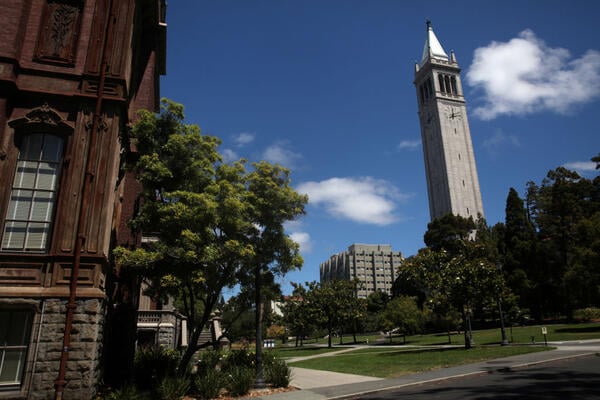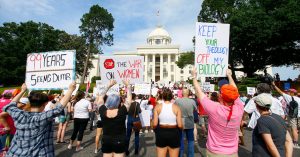The Department of Justice launched investigations into admissions practices at four California universities on Thursday night, accusing them of flouting the Supreme Court’s ruling banning affirmative action in Students for Fair Admissions v. Harvard and University of North Carolina at Chapel Hill.
The “compliance reviews,” as the department called them, will target Stanford University and three University of California campuses: Berkeley, Los Angeles and Irvine.
In a statement announcing the investigations, the Justice Department wrote that the investigations are “just the beginning” of their efforts to “eliminate DEI” in college admissions.
“President Trump and I are dedicated to ending illegal discrimination and restoring merit-based opportunity across the country,” U.S. attorney general Pam Bondi wrote in the statement.
It’s unclear what prompted the investigations or what evidence the department has to support its suspicions of illegal racial preferences in admissions at the targeted institutions. Some affirmative action opponents have suggested that institutions that enrolled higher numbers of minority students last fall, the first class admitted after the Supreme Court decision, may have done so illegally.
Berkeley, UCLA and Irvine all reported upticks in the number of Black and Hispanic students enrolled in the Class of 2028 last fall: 45 percent of students who enrolled at a UC system campus this fall were underrepresented students of color, a 1.2 percent increase from 2023 and a record for the system.
Just hours before the DOJ announced its probe, the Department of Health and Human Services launched its own investigation into admissions practices at UCLA’s medical school, accusing it of illegally considering applicants’ race.
The UC system has been banned from considering race in admissions since 1996, when the state passed a referendum making the practice illegal at public institutions. That hasn’t stopped anti–affirmative action watchdogs from accusing the system of doing so secretly.
Last month, the newly formed public interest group Students Against Racial Discrimination filed a lawsuit accusing the system of practicing affirmative action behind closed doors, citing increases in Black and Hispanic enrollment at its most selective campuses, namely UCLA and Berkeley, and labeling recent admissions policies—like the decision in 2020 not to consider standardized test scores—proxies for affirmative action.
“Since Proposition 209 banned California’s public institutions from considering race in admissions, UC has implemented admissions practices to comply with it,” a UC spokesperson wrote in an email to Inside Higher Ed. “The UC undergraduate admissions application collects students’ race and ethnicity for statistical purposes only. This information is not shared with application reviewers and is not used for admissions.”
Stanford, unlike the UC schools, reported a marked decline in first-year underrepresented students last year, according to the university’s Common Data Set, released last month. Black enrollment at the university fell by nearly 50 percent, and Hispanic enrollment by 14.4 percent; meanwhile, white and Asian enrollment rose by 14.5 percent and 10 percent, respectively.
Luisa Rapport, Stanford’s director of media relations, said the university has not flouted the affirmative action ban, and that following the SFFA ruling, it “immediately engaged in a comprehensive and rigorous review to ensure compliance in our admissions processes.”
“We continue to be committed to fulfilling our obligations under the law, and we will respond to the department’s questions as it conducts this process,” she wrote in an email to Inside Higher Ed.
‘Just the Beginning’
Angel Pérez, president of the National Association for College Admission Counseling, said he’s heard “extraordinary concern” from admissions officers and deans in recent weeks that investigations could spread to their institutions. They don’t know how to prepare because “we have no idea what these compliance reviews even entail.”
What they do know, he said, is that investigations could throw their offices into chaos during the height of admissions season.
“These kinds of reviews are extremely disruptive. They’re also extremely expensive,” Pérez said. “There are some institutions that, you know, may not survive a compliance review given the legal costs.”
In an interview with Inside Higher Ed last month, Edward Blum, president of SFFA and the architect of the nationwide affirmative action ban, said he expected schools that reported higher enrollment of racial minorities in the fall to invoke legal scrutiny, both from the courts and the Trump administration. He said he believed a number of institutions could be “cheating” the SFFA ruling, including some that were not included in this first round of investigations: Yale, Duke and Princeton.
“So many of us are befuddled and concerned that in the first admissions cycle post-SFFA, schools that said getting rid of affirmative action would cause their minority admissions to plummet didn’t see that happen,” he said.
Some colleges are withholding demographic information about their incoming classes altogether. On Thursday, hours after the Justice Department probes were launched, Harvard admitted its Class of 2029 but did not release any information—including demographics, acceptance and yield rates, and geographic data—for the first time in more than 70 years.
In response to multiple questions from Inside Higher Ed about what the compliance reviews would entail or how the department plans to pursue its investigations into admissions offices, a Justice Department spokesperson referred to the initial statement announcing the investigations.
“No further comment,” he wrote via email.
There are some hints, though, as to what form a federal admissions investigation could take. In a December op-ed in The Washington Examiner outlining a plan that has reflected the Trump administration’s higher education agenda so far with uncanny accuracy, American Enterprise Institute fellow Max Eden suggested Bondi initiate “a never-ending compliance review” targeting Harvard University and others to enforce the SFFA ruling.
“She should assign Office of Civil Rights employees to the Harvard admissions office and direct the university to hold no admissions meeting without their physical presence,” Eden wrote. “The Office of Civil Rights should be copied on every email correspondence, and Harvard should be forced to provide a written rationale for every admissions decision to ensure nondiscrimination.”
For the four universities at the center of the investigations, this disruption could be especially pronounced right now, as colleges begin sending out acceptance letters and enter the busiest season for building their incoming classes.
“This could not come at a worse time. It is April; this is enrollment management season,” Pérez said. “For institutions to take the time, energy and resources to [respond to compliance reviews] means that they’re going to have a harder time enrolling their classes.”
‘Absurd’ Accusations
The Department of Justice is alleging that in the year and a half since the SFFA ruling, colleges have skirted the law by continuing to consider race in the admissions process. Those grounds make its targets particularly confusing, given that the University of California system hasn’t used affirmative action in admissions for nearly three decades.
In 1996, California voters passed Proposition 209, banning the practice at public colleges. In the application cycles immediately after, Black and Hispanic enrollment fell precipitously. Pérez said it took many years of experimenting with race-neutral admissions, financial aid and recruitment policies for UC campuses to bring Black and Hispanic enrollment back to their prior rates.
In the months following the SFFA decision, Pérez said college admissions professionals turned to California for lessons in how to maintain diversity without running afoul of the new law.
“Officials and admission professionals [at UC] have been helping other institutions across the United States comply with the Supreme Court decision,” he said. “They have actually served as leaders in this space. To accuse them of violating any law is absurd.”








